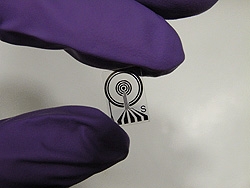The scientists at the Southampton University have come up with a tiny Sensor, which provides highly accurate data pertaining to the sea.
This sensor is extremely compact in size when compared to the conventional bulky equipment used by oceanographers to capture ocean data like temperature, salinity and oxygen content. This sensor is attached to fish to collect data; it can also be attached to buoys or boats.
 Tiny Sensor
Tiny Sensor
Professor Hywel Morgan from the University regards the tiny sensor as cheap and easily deployable devices that can collect and transmit information. He is assisted by a PhD student, Xi Huang and Dr Matt Mowlem of National Oceanography Centre Southampton (NOCS) in developing the prototype for the sensor. This sensor is cheaper, more accurate than the existing equipment and is capable of collecting physical, biological and chemical data of the sea water.
The device, which measures only upto the size of a pen lid, consists of a small battery, an application specific integrated circuit (ASIC) measuring 3mm2 and a solid state sensor. The ASIC microchip has the ability to take measurements at intervals of 1 minute. Transmitting the collected data through water is difficult; hence the sensor stores the data inside. One way of collecting these sensors is from Fishermen by offering them money for returning the tags found in their fishing catch.
Another method is to retrieve the information from the sensor that is attached to the float when the float rises above the water surface. Professor Morgan explained that micro-lithography was used to make the sensor’s glass head fabricated at the Southampton’s nano-fabrication centre. The research team has also devised a method to prevent organism growth on the device.
Apart from Ocean research, these sensors can be used in applications such as monitoring drinking water in reservoirs to detect chemical mix up or algal growth. The sensor is awaiting further tests to establish its stability and accuracy.